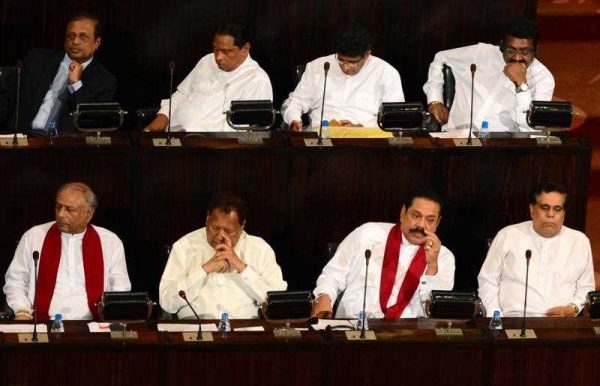Since independence, Sri Lanka has been both fearful of Indian hegemony and usually realistic about its options. The country has to face the difficult reality of dealing with its giant, nervous and sometimes overbearing neighbour. This forces Colombo to perform a delicate balancing act: it must try to create some space for itself through limited relationships with extra-regional powers, while constantly reassuring New Delhi that it will not allow itself to be used to threaten India’s regional dominance.
This delicate balance has long been reflected in Colombo’s external relations with major powers, including with Britain, the United States and China. And although New Delhi usually grudgingly tolerates Colombo’s flirtations, there are real limits.
Colombo knows well the consequences of provoking India’s ire. In the early 1980s New Delhi mistakenly convinced itself that Sri Lanka was going to allow the United States to build a signals intelligence facility and even a naval base on the island. The message for Colombo was clear: there were red lines that Sri Lanka should not cross in its relationships with extra-regional powers.
These events led some to talk about the so-called ‘Finlandisation’ of Sri Lanka: an implicit understanding that Colombo would avoid security relationships with other powers, while India would refrain from interfering in Sri Lanka’s domestic affairs. This idea does not do justice to the intricacies of the relationship, but it does express an uncomfortable truth — that small countries with large and nervous neighbours may find it in their interests to limit the exercise of their sovereignty. Not that Sri Lanka has ever been a client state of India. Indeed, Colombo has often shown itself to be adept at calibrating its strategic distance from India — keeping New Delhi on its toes and leveraging potential benefits from its neighbour.
But this delicate balance came unstuck over the last few years under Rajapaksa’s increasingly authoritarian and corrupt rule — and a shower of Chinese money. Rajapaksa not only seemed to favour Chinese investments but he also began to flirt with a limited Chinese security presence on the island. New Chinese-built ports at Hambantota and Colombo became symbols of Beijing’s presence in the region, fuelling claims of a ‘String of Pearls’ across the Indian Ocean. China built a satellite station and there were rumours of a possible air force presence.
The turning point came in September 2014 when a Chinese submarine and minder made an unexpected visit to Colombo only days before the visit of Chinese President Xi Jinping to New Delhi. It seemed that Beijing was trying to send a clumsy message to India. New Delhi summoned the Sri Lankan foreign minister to suggest that there should be no further visits of Chinese submarines. When Rajapaksa authorised a return visit of the submarine in November, many took this as an explicit signal that Sri Lanka was abandoning its longstanding balancing act and possibly tilting to China.
This, apparently, was a step too far. Only few weeks later, Maithripala Sirisena, then a minister in Rajapaksa’s government announced that he would stand against Rajapaksa as president. By January, Rajapaksa’s regime, which looked like it was permanently cemented into power, was gone. The full extent of India’s involvement in the Sri Lankan elections in January 2015 and again in August 2015 remains unclear, but there is little doubt that New Delhi was at least able to unite Tamil groups against Rajapaksa, no doubt lubricated with plenty of money.
Where does that leave Sri Lanka’s foreign policy? It seems like it will move back towards a long term balancing act. Colombo will not be beholden to India, but it will certainly pay a lot more attention to New Delhi’s security sensitivities while pursuing a more cordial relationship with the West. There may not be any further visits of Chinese submarines any time soon, but Sri Lanka will continue to court Chinese investment to develop Sri Lanka’s infrastructure and manufacturing base. But it will also be careful to ensure that other investors, including from Japan and India, are given investment opportunities on the island. Sri Lanka could have bright economic prospects as a new ‘Bengal Tiger’ economy and China will play an important role in that.
Beijing’s Global Times contends that: ‘Although partisan politics may have a certain effect on bilateral ties … No matter which party takes power, it will maintain a good relationship with China’. That is certainly true, but at the same time, the fall of the Rajapaksa regime does represent a significant set-back for China’s hopes to develop a greater security presence in the Indian Ocean to support its economic interests. Seen alongside moves by Myanmar’s regime to distance itself from Beijing, it is a reminder of the risks of relying on authoritarian leaders for friends.
Dr David Brewster is a visiting fellow at the Strategic and Defence Studies Centre in the College of Asia and the Pacific, The Australian National University.


To understand what is going in Ceylon (Sri Lanka) we have to look in a different angle. The last British Empire was in fact a British-Indian Empire and after the collapse of the partnership it is the Indian Empire. Look at it from this anlgle and you will see a different picture.
Looked at from various angles. Do not see British-Indian Empire anywhere! Can see the scribbling of an immature brat though.
Sri lanka should respect initiatives from China because China has helped us when we were in a critical condition to win war against the terrorists. That cannot be forgotten by the current government. China always stands by us and our country. That was a huge sacrifice made by Chinese government.
The former President was dumped by Lankans because serious instances of corruption were visible. It so happens that Chinese companies were associated in the projects. The new government was mandated by Lankans to investigate these. China must understand this and stand by Sri Lanka come what may.
Insightful!